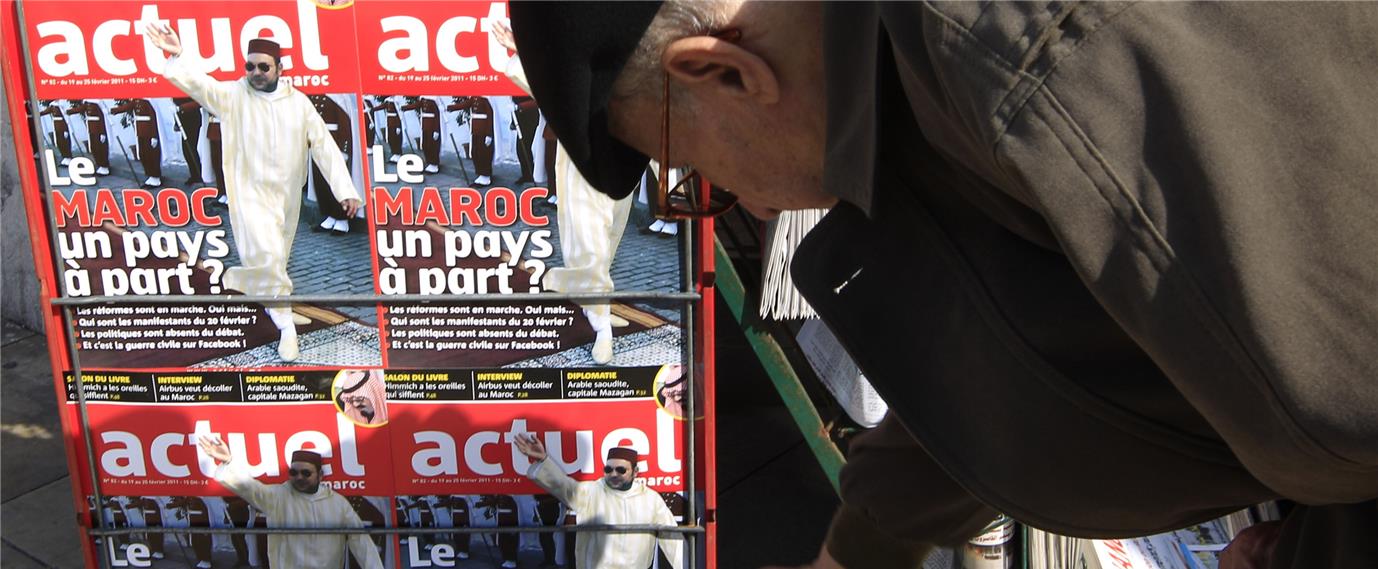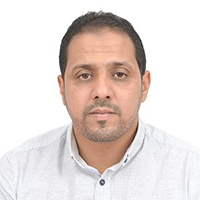شهدت الصحافة المغربية أحداثاً متسارعة، غالباً ما كان يشوبها التناقض الصارخ منذ أكتوبر/تشرين الأول الماضي، إذ مع بدايته عقد أعضاء المجلس الوطني للصحافة جلسة في مقر قطاع الاتصال التابع لوزارة الثقافة والاتصال في الرباط، خصصت لانتخاب رئيس للمجلس ونائب له، وأفضت إلى انتخاب الإعلامي يونس مجاهد عن فئة الصحفيين المهنيين رئيساً، والإعلامية فاطمة الورياغلي نائبة للرئيس عن فئة ناشري الصحف، في تفعيل لما تتضمنه المادة الخامسة من قانون المجلس رقم 90.13، الذي يهدف إلى تطوير حرية الصحافة والنشر في المغرب.
اعتُبرت هذه الخطوة حينها تجسيداً لإرادة حقيقية تسعى إلى تنظيم قطاع الإعلام وفق قواعد ديمقراطية، رغم ما رافق عملية انتخاب المجلس في يونيو/حزيران الماضي من احتجاجات للصحفيين ومقاطعة لهم للانتخابات، وانسحاب قوائم انتخابية تمثل فعاليات إعلامية لم ترض بطريقة الانتخاب.
بعدها، تلقت الصحافة المغربية ضربة موجعة يوم العاشر من نوفمبر/تشرين الثاني الماضي قبيل الاحتفال باليوم الوطني للإعلام (1)، بعدما قضت محكمة الاستئناف في الدار البيضاء بسجن الصحفي توفيق بوعشرين 12 عاماً إثر الاتهامات الموجهة إليه، التي تمحورت حول الاتجار بالبشر والاستغلال الجنسي، إضافة إلى تهمتي العنف والاغتصاب.
وتعود تفاصيل هذه المحاكمة -التي وصفت بأنها محاكمة القرن- إلى فبراير/شباط الماضي حين تم توقيف الصحفي بوعشرين في مقر صحيفة "أخبار اليوم" التي يتولى إدارتها، ووجهت له بعد ذلك تهم عديدة. وقد عرفت محاكمته خلال الشهور التي سبقت النطق بالحكم تفاصيل مثيرة، حيث تم عرض مقاطع لأشرطة الفيديو تعتبرها النيابة العامة أدلة على إدانته، بينما أصر بوعشرين على أن هذه الأشرطة مفبركة وأن محاكمته "سياسية" بالدرجة الأولى.
ولطالما كانت كتابات الصحفي بوعشرين تزعج بعض النافذين في المغرب وجهات أجنبية أخرى، خصوصا المملكة العربية السعودية، إذ سبق أن حكم عليه بدفع مبلغ 49 ألف دولار لصالح وزيرين في الحكومة المغربية بتهمة "التشهير"، كما حُكم عليه وعلى رسام الكاريكاتير خالد كدار عام 2009 بالسجن أربع سنوات لكل منهما مع وقف التنفيذ.
مسلسل محاكمات الصحفيين بتهم مختلفة تواصل أيضاً مع قضية مدير موقع "بديل إنفو" (Badil.info) الصحفي حميد المهداوي الذي أصدرت بحقه المحكمة الابتدائية بالدار البيضاء في يونيو/حزيران الماضي حكماً بالسَّجن ثلاث سنوات بتهمة التحريض وعدم التبليغ.
وتتابعت محاكمته استئنافيّاً خلال شهري نوفمبر/تشرين الثاني وديسمبر/كانون الأول الذي تم في أوله ضم ملف المهداوي إلى جانب ملف الزفزافي ورفاقه المتهمين على خلفية أحداث الريف (2). وقد طالبت منظمة العفو الدولية -في تغريدة- السلطات المغربية بالإفراج عن الصحفي المهداوي "دون قيد أو شرط".
خطوة إلى الأمام وخطوات إلى الوراء!
ترافقت مرحلة الإعداد لقانون الصحافة والنشر في المغرب مع إطراء رسمي وتفاؤل كبير من جانب الجهات المختصة بالإعلام والاتصال على مستوى المملكة. وأعلنت وزارة الاتصال حينها في عهد القيادي بحزب العدالة والتنمية مصطفى الخلفي، أهمية هذا القانون بما يتضمنه من مواد وإجراءات جديدة تضمن حرية الصحافة في البلاد، وحرص الوزارة على تفعيل مبدأ النقاش والتشارك مع كافة الفاعلين المهنيين في القطاع لإخراج القانون إلى حيز الوجود.
نشرت الحكومة المغربية في الجريدة الرسمية يوم 15 أغسطس/آب 2016 القانون رقم 88.13 المتعلق بالصحافة والنشر، إلى جانب القانون رقم 89.13 المتعلق بالنظام الأساسي للصحفيين المهنيين، والقانون رقم 90.13 الخاص بالمجلس الوطني للصحافة.
وأهم ما جاء به القانون من إجراءات حسب واضعيه، إلغاء العقوبات السالبة للحرية للصحفيين، وتعويضها بغرامات مالية وتحقيق الاعتراف القانوني بالصحافة الإلكترونية، بالإضافة إلى إرساء الحماية القضائية لسرية المصادر، وضمان الحق في الحصول على المعلومة.
وفي ما يخص الحق في الحصول على المعلومة، صدر في الجريدة الرسمية عدد 6655 بتاريخ 12 مارس/آذار 2018 قانون رقم 31.13 المتعلق بالحق في الحصول على المعلومات، الذي ينسجم -حسب ما جاء في نصه- مع الفصل 27 من الدستور المغربي. وشملت قائمة الاستثناءات من التمتع بهذا الحق؛ المعلومات المتعلقة بالدفاع الوطني وبأمن الدولة الداخلي والخارجي، وتلك المتعلقة بالحياة الخاصة للأفراد والمعلومات التي من شأنها المس بالحريات والحقوق الأساسية المنصوص عليها في الدستور، وحماية مصادر المعلومات.
بيد أن منظمة "ترانسبرانسي المغرب" (transparency Morroco) عارضته عندما كان لا يزال مشروعًا، وأصدرت بياناً قالت فيه إن "المشروع يتميز بالطابع التراجعي لكونه يوسع دائرة الاستثناءات بواسطة صيغ ملتبسة تقيد هذا الحق".
بحسب رئيس منظمة "حريات الإعلام والاتصال في المغرب" محمد العوني، فإن نضالاً طويلاً أوصل إلى قانون جيد لحق الحصول على المعلومة، مضيفاً أن القانون يحترم المعايير الكونية والحقوقية. لكن العوني يرى أنه لم يصدر بالصيغة الملائمة، داعياً إلى تفعيله "رغم نواقصه باتجاه خلق ثقافة الحق في المعلومات وانتشارها في المجتمع".
ولفت الانتباه إلى أن كل المتغيرات التي يشهدها الإعلام المغربي -بما في ذلك اعتماد قانون للصحافة والنشر وانتخاب المجلس الوطني للصحافة- "تعبّر عن اضطراب الإعلام وحريته واستقلاليته، وتخوف مؤسسات في الدولة وبعض أطراف المجتمع من مكانة وأدوار الإعلام، لعدة أسباب من ضمنها عدم ترسخ قيم الديمقراطية وممارستها".
برأي العوني، يشوب المتغيرات بعض التردد في الإصلاح، بسبب مضامينها الناقصة بالنسبة لصلاحيات المجلس التي لا تتضمن الدفاع عن حرية الإعلام، وإمكانية معاقبة المؤسسات التي لا تحترم استقلالية الصحفي ومكانته، وبالنسبة للقانون الذي يحيل على القانون الجنائي ولم يقطع مع العقوبة السالبة للحرية للصحفيين.
تكفي الإشارة إلى أنه منذ اعتماد قانون الصحافة والنشر عام 2016، وما رافقه من تفاؤل بشأن القطع مع ممارسات سابقة للتضييق على الممارسة الصحفية، عرفت الصحافة المغربية عدة تراجعات حسب المنظمات الدولية، بحيث أصدرت منظمة "مراسلون بلا حدود" في أبريل/نيسان الماضي تصنيفًا جديدًا ضمن مؤشر حرية الصحافة في العالم، احتل المغرب فيه المركز 135 عالميًّا، مسجلا تراجعًا في ممارسة الصحافة بمركزين، مقارنة مع العام الماضي، بحسب المنظمة نفسها.
إن هذا التراجع يعود أساسا -حسب المنظمة- إلى "القدر الكبير من المضايقات القضائية للصحفيين"، بالإضافة إلى أن "السلطات عرقلت عمدًا عمل وسائل الإعلام الوطنية والأجنبية التي قامت بتغطية احتجاجات حراك الريف"(3).
انتقاد دولي وتفنيد رسمي
بالإضافة إلى التراجع المسجل بالنسبة للمغرب في تصنيف منظمة "مراسلون بلا حدود" الخاص بمؤشر حرية الصحافة، كشف تقرير لمنظمة "فريدوم هاوس" تراجعًا في مؤشر حرية الإنترنت، إذ جاء المغرب في المركز 33 عالميًّا والثاني على مستوى جهة الشرق الأوسط وشمال أفريقيا بمعدل 45 نقطة من مجموع 100 نقطة.
وصنّف التقرير المغرب في خانة الدول الحرة جزئيًّا بعد حصوله على 11 من أصل 25 نقطة في مؤشر الوصول إلى المعلومة، و10 من أصل 35 نقطة في مؤشر تقييد المحتوى، و24 من أصل 40 نقطة في مؤشر انتهاك حقوق مستخدمي الإنترنت. وأضاف التقرير أن السلطات المغربية تستخدم وسائل دقيقة للحد من المحتوى عبر الإنترنت، كما تنتهك حقوق المستخدمين عبر قوانين مكافحة الإرهاب (4).
لكن وزارة الثقافة ردت في نوفمبر/تشرين الثاني الماضي بأن التقرير "غير دقيق وغير موضوعي وينقصه الدليل، ولا يستحضر المؤشرات الإيجابية لحرية الصحافة والإعلام الرقمي التي تمكّن المغرب من التصنيف ضمن الدول التي تتمتع بحرية الإنترنت ووسائل التواصل الاجتماعي"(5).
بعد المقاطعة.. قانون لتجريم الإشاعة
عاش المغرب خلال العام 2018 صيفا ساخنا بعد الإعلان عن مقاطعة قسم كبير من الشعب المغربي لعدد من المنتجات الأساسية المغربية، لدوافع وأسباب متعددة. وأثرت المقاطعة سلبًا على المنتجات، وتراجعت عائداتها بشكل غير مسبوق خلال فترة المقاطعة. وتعود ملكية بعض هذه المنتجات لشركات أجنبية -فرنسية على وجه الخصوص- وأشخاص نافذين وقريبين من دوائر الحكم.
ومع بداية سبتمبر/أيلول الماضي، دخل قانون محاربة الإشاعة ونشر الأخبار الزائفة حيز التنفيذ، وأصبحت الأخبار الكاذبة والإشاعات تعرّض صاحبها للمساءلة القانونية والمتابعة القضائية حسب النص التفصيلي للقانون الذي صادقت عليه الحكومة من قبل.
وينص القانون على أن كل من قام عمدًا وبكل وسيلة -بما فيها الأنظمة المعلوماتية- بنشر إشاعة أو أخبار مغلوطة دون وسائل إثبات صحتها، أو التقاط أو تسجيل أو بث أو توزيع أقوال أو معلومات صادرة بشكل خاص أو سري دون موافقة أصحابها، سيعاقب بالسَّجن من 6 أشهر إلى 3 سنوات، وغرامة مالية من ألفين إلى 20 ألف درهم، فضلا عن عقوبات إضافية تخص مقتضيات أخرى متعلقة بنص القانون.
من جهته، ينظر الدكتور الطيب بتوبقالت إلى ظاهرة الأخبار الزائفة في المغرب من منظور تاريخي، إذ يرجعها إلى العهد الاستعماري حين كانت السلطات الفرنسية والإسبانية تعتمد على سياسة نشر الإشاعة والأخبار الزائفة للتأثير على نشاط المقاومين المغاربة والحد من تأثير نضالهم.
ويحذر بتوبقالت من خطورة الظاهرة على الأمن المجتمعي، لكنه يرى أن ذلك لا يعني بالضرورة إقرار قوانين يمكن أن تشكل تضييقًا على الحريات العامة.
أما الأستاذ محمد العوني فيرى أن سن قانون لمحاربة الإشاعة والأخبار الزائفة ما كان ليشكل تهديداً "لو لم يكن السياق مليئا بحالات الالتباس وسوء التأويل والاعتداء على الحريات".
إن المتتبع لمسار إصلاح قطاع الإعلام في المغرب، لا يمكنه التقليل من المجهود المبذول في هذه العملية والمكتسبات المحققة على أرض الواقع مقارنة مع المحيط العربي والإقليمي. لكن السير في مشوار الإصلاح بخطوة إلى الأمام وخطوات إلى الوراء، يمكن أن يشكل خطرًا على مجال حرية الصحافة في المغرب، لأن "القوانين التي تلجم الأفواه وتحطم الأقلام تهدم نفسها بنفسها"، حسب الفيلسوف الهولندي باروخ إسبينوزا.
1- يحتفل الإعلاميون المغاربة يوم 15 نوفمبر/تشرين الثاني من كل عام، باليوم الوطني للإعلام والاتصال، باعتباره مناسبة للوقوف عند التقدم الحاصل في مجال حرية الرأي والتعبير، ولاستشراف الآفاق والتحديات التي تواجه مهنة الصحافة والإعلام.
2- حراك الريف هو سلسلة من الاحتجاجات في مدينة الحسيمة المغربية منذ مقتل الشاب محسن فكري يوم 28 أكتوبر/تشرين الأول 2016، ومن أبرز قادته ناصر الزفزافي الذي اعتقل يوم 29 مايو/أيار2017، والصحفي حميد المهداوي الذي اعتقل يوم 20 يوليو/تموز 2017 على خلفية تغطيته للحراك.
3- https://rsf.org/en/morocco-western-sahara
4 - https://freedomhouse.org/report/freedom-net/2018/morocco
5- بلاغ وزارة الثقافة والاتصال- قطاع الاتصال https://freedomhouse.org/report/freedom-net/2018/morocco








































